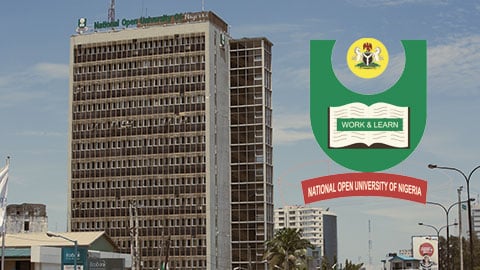Education
NOUN, NUC drill 271 VCs, DAPs, Others on Emerging Trends in Strategic Planning

The National Universities Commission (NUC) and National Open University of Nigeria (NOUN) have graduated the fifth set of participants in the series of capacity building activities to strengthen the implementation of the 2019-2023 Blueprint on the Rapid Revitalisation of University Education in Nigeria.
Executive Secretary, NUC, Professor Abubakar Rasheed who was represented by Dr. Biodun Saliu, in his remark, underscored the importance of strategic planning for a revitalised Nigerian university system as he urged all university managers to take steps to reformulate their strategic planning to respond to contemporary developments in higher education.
The training programme is one of the thrusts of the Rasheed Revolution in the Nigerian university system.
Module 5 of the training which was conducted between July 18 and August 29, 2022 was on theory and practice of strategic planning and was designed to reposition Nigerian universities for delivery of quality education through the implementation of well-designed strategic plans.
A total of 271 Vice-Chancellors, Deputy Vice-Chancellors, Directors of Academic Planning, senior academics and staff of NUC and NOUN graduated from the eight-week course on Tuesday, August 30, 2022.
In an earlier address, the Vice-Chancellor of NOUN, Professor Olufemi Peters expressed delight that the NOUN platform is being used for the conduct of the training through the Virtual Institute for Capacity Building in Higher Education (VICBHE).
Peters noted that “This confirms, increasingly, the high quality of NOUN’s delivery system”.Of the 271 participants who graduated, 195 earned Distinction.
Professor Ibiyinka Fuwape of Michael and Cecilia Ibru University won the Nimi Briggs Prize for the Best Vice-Chancellor in the course while Professor Bolanle Akinwande of Ladoke Akintola University won the Ruqayyatu Ahmed Rufa’i prize for best female participant and four other prizes.
The Olufemi Peters Prize for the best former Vice-Chancellor in the course was won by Professor Ezzeldin Mukhtar Abdurahman, former Vice-Chancellor, Bauchi State University.
The Abubakar Adamu Rasheed prize for best participant in the course was won by Professor Abdulrasheed Adeoye, former Dean of Arts of University of Ilorin.
The Olusola Oyewole Prize for the best participant from other African countries was awarded to Dr. Ndayishimiye Richard from Burundi.In his keynote address at the event, Professor Juma Shabani, Chairman of the National Council for Higher Education of Burundi, underscored the importance of strategic planning for African universities in meeting national and regional aspirations.
He gave the example of the University of Burundi doctoral school as case study of how benefits can be derived from well-developed strategic plans.
The Director/Facilitator of VICBHE, Professor Emeritus Peter Okebukola presented an overview of the training. According to Okebukola “during the course, participants learned conceptual and theoretical framework of strategic planning; key elements and stages of strategic planning; setting up a website for progressive development of a strategic plan.
Other areas were comparative analysis of university strategic Plans; implementing steps 1 to 6 in the VICBHE Strategic Plan Model and uploading to the website and practical steps in midterm and final review of a strategic plan.
It was eight weeks of lectures, weekly discussion forums, weekly tests, weekly practical exercises, end-of-module comprehensive examination and a project.
Okebukola further noted that “one of the products of the practical training is the development by each participant of a strategic plan.
“These plans were contributed as case studies to a book by participants who earned distinction grades in the project.
“The quality of the case studies is indicative of the commitment of the participants to the training. Each case study reports extensively on the process leading to the development of the plan. Very detailed and well-costed plans resulted from this process. More importantly, each document has a monitoring and evaluation component which will be basis for periodic review”.
The book was publicly presented at the graduation ceremony by the Secretary-General of the Association of African Universities, Professor Olusola Oyewole.
Education
NECO Extends Global Footprint, Accredits Schools in Niger Republic, Equatorial Guinea

The National Examinations Council (NECO) has expanded its international reach by accrediting additional foreign schools in Niger Republic and Equatorial Guinea to conduct its Senior School Certificate Examination (SSCE) and Basic Education Certificate Examination (BECE).
These newly accredited schools will join those in Saudi Arabia, which previously secured NECO’s accreditation, to begin writing the examinations starting next year.
NECO’s Director of Information and Public Relations, Mallam Azeez Sani, announced this in a statement issued on Saturday in Minna. He said the initiative reflects NECO’s commitment to broadening its horizons and establishing a global presence.
Thorough Accreditation Process
According to Sani, NECO’s Accreditation Team visited the schools to assess their readiness for the examinations.
The evaluation process included inspections of classrooms, laboratories, libraries, computer labs, workshops, examination halls, and sports facilities.
“After a comprehensive assessment, the schools were granted full accreditation status for both SSCE and BECE,” he said.
This expansion, he added, highlights NECO’s dedication to delivering quality education assessments that transcend Nigeria’s borders, offering opportunities for students to benefit from its expertise and standards.
Strengthening Regional Impact
The council’s growing influence has made it a key player in Africa’s education sector. Currently, NECO examinations are being conducted in several countries, including Benin Republic, Togo, Côte d’Ivoire, Niger Republic, Equatorial Guinea, and Saudi Arabia.
NECO also disclosed that the ongoing NECO SSCE External Examination is being conducted at the UNHCR School in Diffa, Niger Republic—the first NECO SSCE External Centre outside Nigeria.
The council reiterated its commitment to advancing education on the continent and beyond. “With its expanding global presence, NECO is poised to become a leading examination body in Africa, fostering educational excellence and contributing to the development of the education sector across the region,” the statement read.
This international accreditation further reinforces NECO’s standing as a credible examination body, providing students worldwide with access to reliable and standard assessments.
Education
Senate Commits to Making Nigeria a Hub of Educational Excellence

The Senate has reaffirmed its commitment to making Nigeria a beacon of educational excellence, emphasizing the critical role of education in driving national progress.
This pledge was made on Thursday during a public hearing organized by the Senate Committee on Tertiary Institutions and TETFund to discuss two bills: The Federal Polytechnic Onueke, Ezza South, Ebonyi (Establishment) Bill, 2024 and The Alvan Ikoku Federal University of Education, Owerri (Establishment) Bill, 2024
Representing the Senate President, Godswill Akpabio, Senator Titus Zam (Benue North West) highlighted the Senate’s dedication to fostering inclusive and sustainable development through education.
“Education remains a cornerstone for national progress,” Senator Zam noted. “Its accessibility to all Nigerians, irrespective of geographical or socio-economic status, is a priority for this Senate.”
He emphasized that the input of stakeholders at the hearing would underscore a shared resolve to strengthen Nigeria’s educational framework, expand opportunities for intellectual growth, and provide technical and vocational training for the nation’s youth.
Akpabio, through Senator Zam, assured Nigerians of the Senate’s dedication to legislative measures that promote equity, national growth, and prosperity.
Chairman of the Senate Committee on Tertiary Institutions and TETFund, Senator Muntari Dandutse, explained that the Federal Polytechnic Onueke Bill aims to bolster technical and vocational education, aligning with the government’s efforts to reduce unemployment and enhance socio-economic conditions.
Similarly, Senator Kenneth Eze (Ebonyi Central), sponsor of the Federal Polytechnic Onueke Bill, emphasized that the institution would address pressing challenges in the labor market by focusing on skill-based education, ICT, and applied sciences.
“This initiative represents a paradigm shift for a nation grappling with high unemployment rates. It is a step toward advancing human capital development and securing a brighter future for Nigerian youths, particularly those in Ebonyi State,” Senator Eze said.
The Senate reiterated its commitment to legislative initiatives aimed at strengthening the education sector and creating opportunities for skill acquisition and intellectual development. By supporting these bills, the Senate seeks to position Nigeria as a global leader in education and human capital development.
Education
In Response to Viral Bullying Incident, FG Suspends 13 FGC Enugu Students

The Federal Government has suspended 13 students of the Federal Government College (FGC) Enugu for six weeks following an alleged bullying incident that was widely circulated on social media.
The suspension was ordered by the Minister of Education, Dr. Tunji Alausa, who emphasized that safety and discipline are paramount in federal schools.
According to Folashade Boriowo, the Director of Press and Public Relations in the Ministry of Education, the incident involved a gang assault on an SS1 day student and raised serious concerns about student welfare at FGC Enugu.
The viral video prompted the ministry to establish a disciplinary committee to investigate, leading to the temporary suspension of the students involved.
Dr. Alausa has directed the School-Based Management Committee to collaborate with security agencies to conduct a thorough probe into any possible external influences.
In addition, the government has introduced enhanced security measures at the college, with law enforcement presence and strengthened safety protocols.
As part of the response, the ministry will also provide counseling and rehabilitation services to promote a safe, positive school environment for all students involved.
-

 Crime1 year ago
Crime1 year agoPolice nabs Killer of Varsity Lecturer in Niger
-

 News10 months ago
News10 months agoFCT-IRS tells socialite Aisha Achimugu not to forget to file her annual returns
-

 Appointment1 year ago
Appointment1 year agoTinubu names El-Rufai, Tope Fasua, others in New appointments
-

 News From Kogi1 year ago
News From Kogi1 year agoINEC cancells election in 67 polling units in Ogori-Magongo in Kogi
-

 News From Kogi1 year ago
News From Kogi1 year agoEchocho Challenges Tribunal Judgment ordering rerun in 94 polling units
-

 News1 year ago
News1 year agoIPOB: Simon Ekpa gives reason for seperatists clamour for Biafra
-

 Metro8 months ago
Metro8 months ago‘Listing Simon Ekpa among wanted persons by Nigeria military is rascality, intimidation’
-

 News11 months ago
News11 months agoKingmakers of Igu/ Koton-Karfe dare Bello, urge him to reverse deposition of Ohimege-Igu

Pingback: Compilation of Press reports on NOUN,NUC train VCs,DAPs,others on strategic planning | NOUN